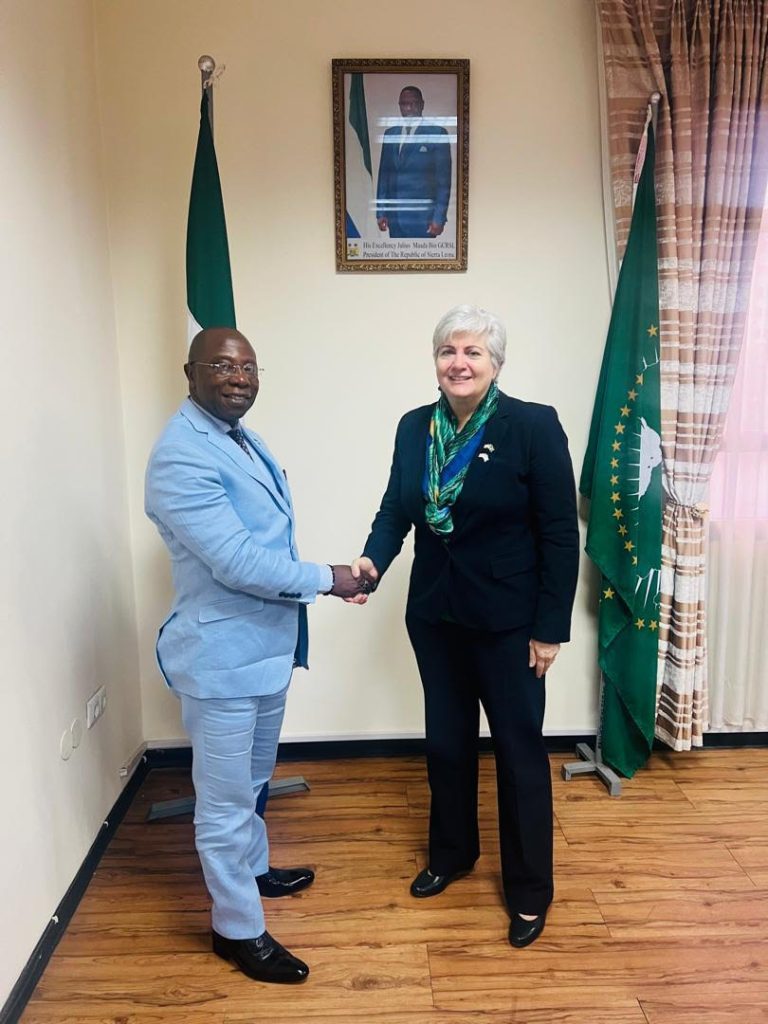Stephanie S. Sullivan, the newly appointed US Ambassador to the African Union, recently paid a courtesy visit to His Excellency Ambassador Harold Bundu Saffa, who is Sierra Leone’s Ambassador Extraordinary Plenipotentiary and currently Chair of the C-10 Group of African Ambassadors in Ethiopia. This meeting, held at the Sierra Leone Mission in Addis Ababa, emphasized the value of collaboration between the United States and African countries, particularly in addressing pressing global issues.
Ambassador Saffa greeted Ambassador Sullivan and expressed confidence in Sierra Leone’s current status as President of the United Nations Security Council. He stated that Sierra Leone plans to use its presidency to address critical global security issues and advocate for UNSC reform. A major point of discussion was the need for Africa to be granted a permanent seat on the Council, complete with veto power, so that the continent can influence decisions that will have a significant impact on its future.

During the meeting, Ambassador Saffa emphasized the importance of the United States as a strategic ally for Sierra Leone, especially given the UN Security Council presidency. He stated that Sierra Leone’s President, Dr. Julius Maada Bio, is committed to ensuring that Africa is recognized as an integral part of the global community. Saffa cited the President’s recent address in New York at the start of Sierra Leone’s UNSC presidency, in which he passionately articulated the need to address Africa’s historical injustices. “The continent can no longer afford to be a bystander in decisions affecting her,” Saffa lamented, indicating a strong desire for Africa to actively participate in global governance.
Ambassador Saffa also expressed satisfaction with Sierra Leone’s friendly relationship with the United States, acknowledging the US government’s support for a variety of development initiatives. He specifically thanked the United States for its assistance, particularly the recent approval of the Millennium Challenge Corporation (MCC) compact, which is expected to boost Sierra Leone’s economic growth and development.
Ambassador Sullivan responded by thanking Ambassador Saffa for the warm welcome she received. She congratulated Sierra Leone on taking over the UN Security Council presidency for August, emphasizing the significance of the month’s agenda in promoting global peace. Sullivan acknowledged Sierra Leone’s wealth of experience and integrity, and he expressed confidence in the country’s ability to effectively contribute to the Council’s mission. She reaffirmed the United States’ commitment to collaborating with Sierra Leone to address global issues, including the critical need for UNSC reform.
The two ambassadors also discussed several regional and global security issues, such as the ongoing conflict in Sudan and the instability in the Sahel. These discussions emphasized the importance of working together to address transnational security challenges.
Ambassador Saffa used the opportunity to express Sierra Leone’s gratitude for the US administration’s recent efforts to facilitate a ceasefire in Gaza. He reiterated Sierra Leone’s call for a permanent ceasefire and increased humanitarian aid for Gaza’s beleaguered population, emphasizing that a two-state solution is the only way to end the Palestinian conflict for good. This solution envisages Israel and a viable Palestinian state coexisting in peace and security.
The discussion also included current global health issues, particularly the outbreak of Mpox disease, which has been declared a public health emergency by both the World Health Organization and the African Union Centre for Disease Control (CDC). Ambassador Saffa requested US assistance in strengthening the African Union’s CDC to combat such health crises effectively.
Ambassadors Sullivan and Saffa reaffirmed their commitment to continuing their collaborative efforts to strengthen bilateral and multilateral relations, emphasizing the importance of partnership in addressing global issues and advancing mutual interests. Their meeting was a positive step toward greater cooperation between the United States and African countries in the pursuit of peace, security, and development.
